I recently had to rework some sloppy training on my part. It took me awhile to notice that I’d let things slip. Tonka is a calm and amenable gelding. But even a horse like that is always adjusting their behavior to what their human is doing. Just because you’ve taught your horse to do something, doesn’t mean that they’ll maintain that good behavior if you slack off.
My wake-up call was that Tonka was getting nippy with the staff at the barn. On our walks, he was grumpy, bumping into my arm, and crowding me.
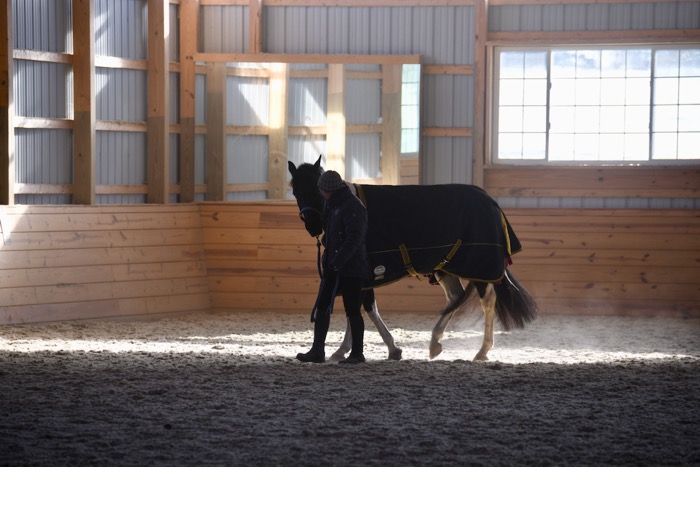
We humans are verbal beings. Horses are not. They primarily communicate with body language. Usually their actions are subtle. These are animals who tell each other to move out of the way with a sideways flick of an ear. They talk a lot with their muzzles. A wiggle of a lip on another’s neck conveys friendship. Affection is shown by mutual grooming with incisors. When annoyed, teeth are used to nip, but without intent to harm. Hard bites are rare (I see them in crowded, stressed environments – that’s another story.) I don’t know how long Tonka had been trying to tell me something before it escalated to the equivalent of him yelling at me, but I finally heard him.
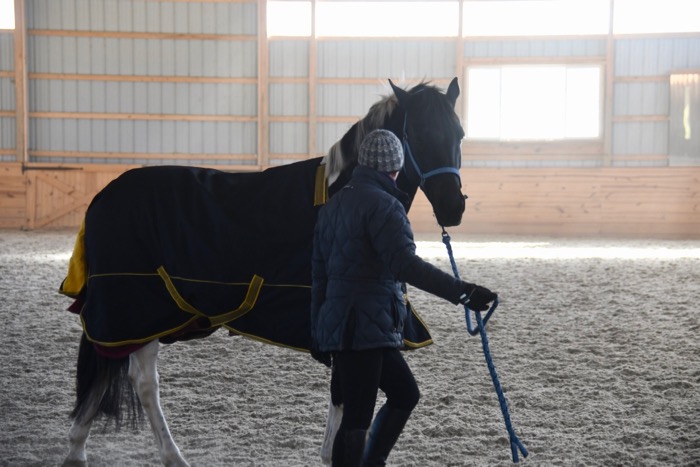
Tonka was frustrated. He knew that I had food on me, and he wanted it. I’d thought that I was clear about when he got cookies, but my criteria and delivery had gotten messy. It was so fun – for me – to feed Tonka, that’d I’d lost sight of how it was working for him. In and out of training sessions, I was reaching into my pocket, at what must have seemed like totally arbitrary moments. He’d noticed that the motion of hand to pocket was reliably what predicted food, not his behavior or a verbal signal from me.
I had to disconnect the association that Tonka had made between getting treats and my hand going into my pocket. The plan was simple. During our walks around the indoor, I’d touch my jacket and no food would appear. When he stopped reacting to that, I’d reach my hand into my pocket, and again, no food would materialize. Sometimes, I’d put my hand in and pull out my phone. Through all of this, we’d keep walking.
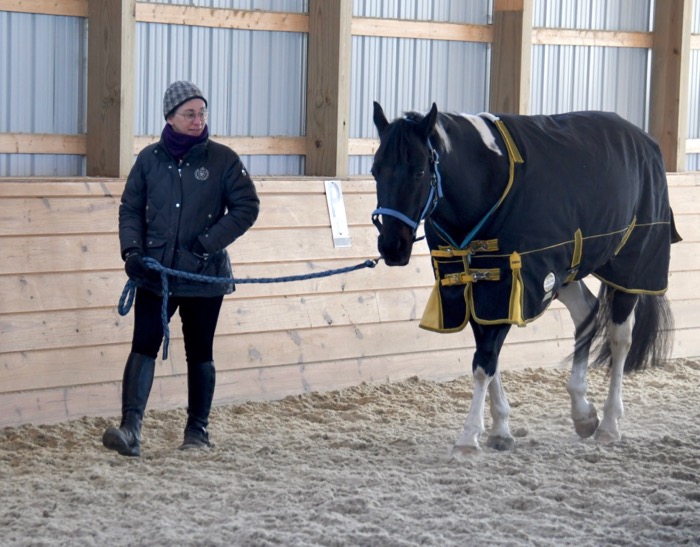
I knew there’d be initial frustration on his part. I was right.
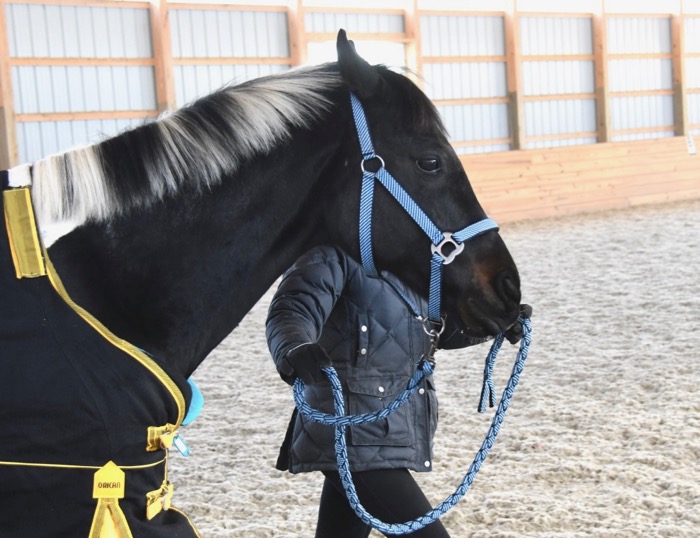
Tonka even reached over and grabbed my arm with his teeth! He didn’t mean to inflict pain, rather he was trying to get me to stop walking and to feed him. I said “Eh! Not allowed!” and kept walking.
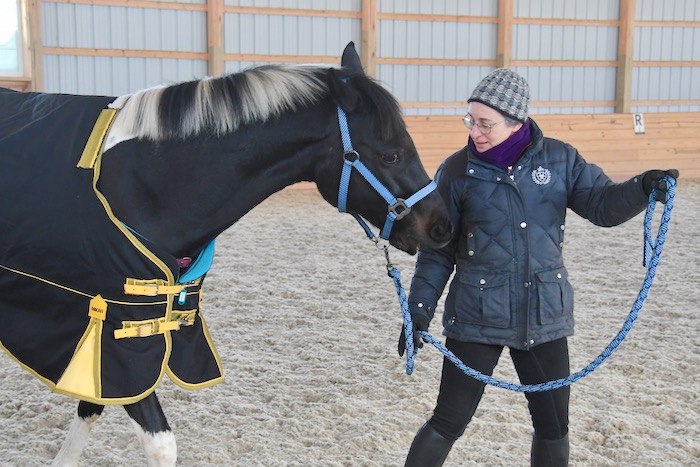
Day after day we walked.
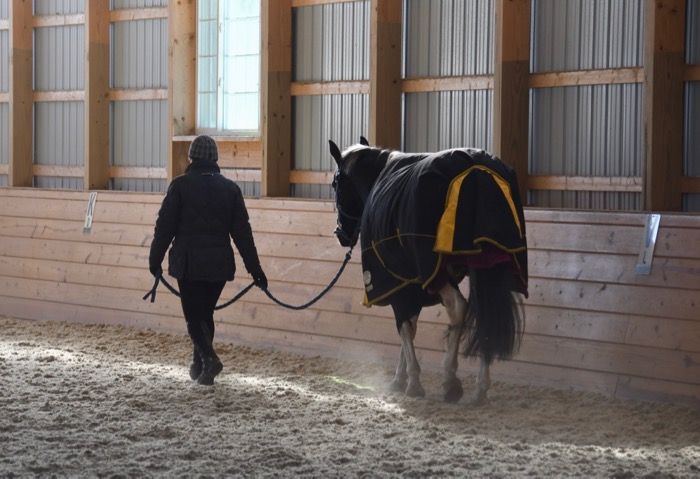
Being companionable and relaxed is a state of being that horses would like as their default. Once Tonka stopped paying attention to my hands and pockets, that’s how he could be.
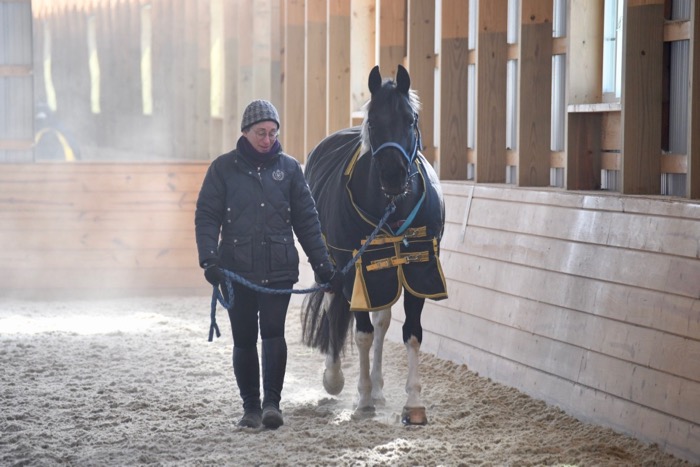
A calm and low-key demeanor is especially important when the footing is bad. Now that Tonka is no longer focusing on my pockets, that’s exactly how he’s going.
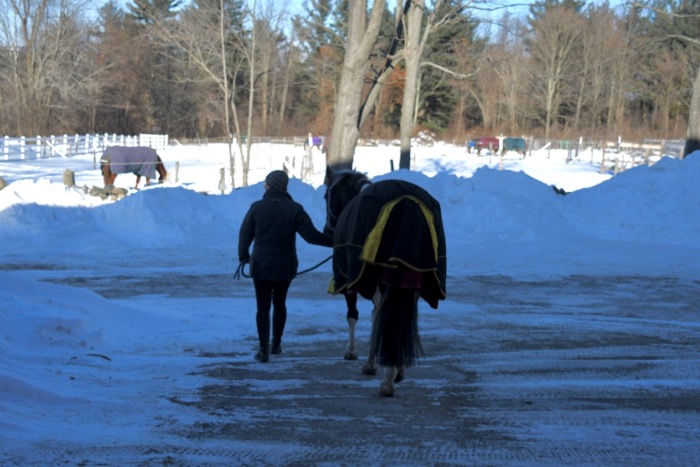
(I do continue to use food in training, but it’s within prescribed bounds to keep everyone safe and content. As with all behavior, what was going on was complicated and my response has been equally multifaceted. This story is only a small piece of the training picture. I’m working on more posts about food rewards, and extinction. Stay tuned!)
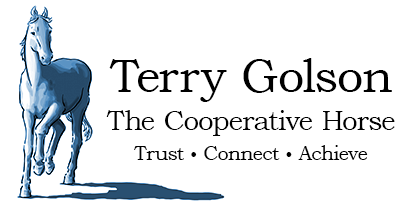

His face in that second photo is priceless. I can fill in the thought bubble on that one!
Good training opens the lines of communication both ways. Sometimes, though, you don’t want to hear what they’re saying! He’s sure telling me off, isn’t he? 🙂
I’ve never been a fan of treats with horses, most owners that I’ve worked with don’t have the discipline to use them effectively and the horses end up getting nippy.
Good for you for recognizing and owning the problem. Would be interesting to hear how you counsel clients to avoid getting into a similar situation.
I’ll be writing about that in the future. One issue is that many horses have food anxiety, and for those you have to have special protocols in place. I’ve wrote about that here: https://cooperativehorse.com/2016/12/training-with-food-sometimes/
But there’s much more to be said on the topic! I will blog about more about that.
I’m giving a short talk on this topic at the Progressive Equine Forum (a training conference next month) and after that’s over, I’ll edit it into a blog.
Thank you, Terry! Very opportune for me, about keeping clear boundaries and being consistent. Please do post more on training with food rewards. It has been working well for me and Milly (mare), but I’m very aware of having a lot to learn. It’s so easy to cause frustration by mistake or through not paying attention etc.
Horses express frustration in ways that are immediately threatening to people, so yes, it’s so important to use food in ways that minimize those issues. It’s not easy! It’s also not a simple matter of protective contact (training behind a barrier) or training for “head forward” because horses are often frustrated with those protocols, and frustration is the opposite of the relationship we’re trying to foster. The good news is that our relationships are fluid, we can fix mistakes, and our horses are willing to put up with us 🙂
So nice when you post about things that aren’t going so good, as well as when they are working for you, and also have a possible “fix” for the problem. Consistency isn’t always easy it’s fun for us to see them happy by giving them a treat.
We got a horse about a year and a half ago, the one that had the dangerous anxiety problem, that had been treated like a big family pet before we got him, apparently given treats constantly. He is much better now, only gets treats in his feed box. I still have to correct him sometimes when leading him as he still occasionally wants to look in my hands as I’m leading him. He’s really a sweet horse, likes to be around us, just needed to learn some boundaries.